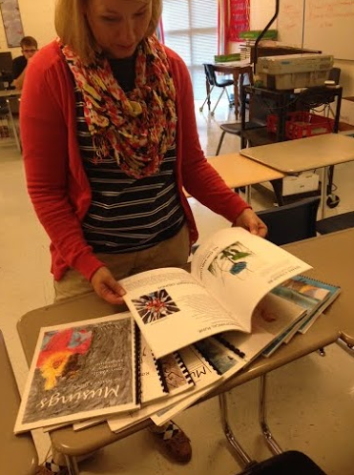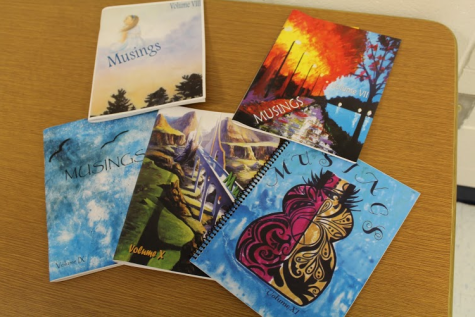Imagination put to use in new advanced creative writing class

A student reads junior Allie Bunting’s piece, “Time Lapse” in the 2015 issue of Musings.
October 5, 2015
As junior Ashton Nowicki walked up the 700 hall to creative writing class, she couldn’t wait to relax her mind and spill her imagination onto paper. “I look forward to this class every day,” Nowicki said. “It’s one of my favorite classes.”
English teacher Jillian Bowen teaches Nowicki’s Advanced Creative Writing class, which before this year, didn’t exist.
Bowen has been trying to make this a class at the Mill for several years. In order to make this class possible, she and English teacher Justin Spencer, who have been working with creative writing at the school for five years, first had to found out how many students were interested in taking the class.
“We had enough people interested, and here we are,” Bowen said. The number of periods during the day also played a role in creating this class. In previous years, only six periods were available, and Spencer and Bowen planned to have a period for Advanced Creative Writing and another one for Writer’s Workshop. “Because of the seven period day, we were finally able to have two classes,” Bowen said.
Each day Bowen starts the class off with a warm-up prompt. “We start off class with a prompt and have 10 to 15 minutes to write,” Nowicki said. She thinks “the prompts are broadly based, and because they are broad, it gives you the opportunity to make up your own story.” Students may share what they wrote for the prompt, but it is not required.
Senior Jing Yang also feels that the class is mainly independent. “We are able to write anything we want,” Yang said. Yang enjoys creative writing “because it’s a great way to store memories and describe [her] feelings.”

Bowen reminisces over works in the 2007 issue, which was her second year working with the magazine.
Yang has been writing since elementary school, and she said that creative ideas come to her pretty easily, and sometime in the future, Yang hopes to publish a novel.
Within the tree of creative writing, different branches of genres exist “like poetry, first-person narrative, memoir, fairytale, fantasy, essay, nonfiction, and of course, short stories,” Bowen said.
Writing poems and first-person narratives are sophomore Kirsten Oates’ favorite genre. “I like to write those because they’re the easiest way for me to get my point across, and the ideas come to me naturally,” she said.
In addition to writing creative pieces, the advanced students carry out the duties to publish the literary magazine, Musings, by organizing the layout, providing pieces for the staff section and reviewing submitted pieces.
Bowen began her work with the magazine because it offered her a chance to do something she enjoyed, teaching writing and publishing skills to students in the 2005-06 school year. She began collaborating with former teacher Bob Covel, who founded the magazine in 2004. Currently, Bowen and Spencer have held the ropes of Musings for a total of five years.
Prior to the Bowen and Spencer partnership, in 2004, Spencer headed the school’s writing club when he was approached by several students who asked to meet a couple days a month after school for creative writing purpose. He didn’t start with the magazine because “I wasn’t familiar with Musings as a new teacher, and I figured the creative writing club would be a good club to feed into the magazine.”
After Covel stopped working with the magazine in the 2006-07 school year, Bowen directed Musings alone, but in 2008 they could not publish because of financial issues. The magazine resumed in the 2009-10 school year when Spencer joined Bowen.

For the past five years, issues of Musings have featured different cover art created by student artists.
Since the time Spencer joined the Musings team, it has won first place titles for 2012-13 and 2013-14 issues with the American Scholastic Press Association, which gave the Special Merit award. Last year, Musings earned an “Excellent” rating from the Georgia Scholastic Press Association, and Bowen plans to increase the magazine to the “Superior” level.
The awards gracefully demonstrate the student’s hard work on the magazine. Nowicki said she finds it a hard job running a magazine. “There is a ton of work that goes into planning, like making certain deadlines, and physically, the magazine has to look good,” she said.
Junior Allie Bunting agrees. She has had three pieces of her work published in Musings and “although there were a couple of stressful moments, it was all worth it because I had a great experience working on it and I felt like I made a huge accomplishment,” Bunting said.
One of her pieces has been published in the literary novel, “Eloquence,” and various students’ works have been published in other literary art collections like “A Collection of Poets.”
Any student at the Mill has the chance of getting their work published in Musings. To apply, they must drop their work into one of the folders for Musings submissions in their English teachers’ classrooms. The work must be submitted by late February, which is when the class begins working to produce the magazine.
The students in the class rank each work from 1-10 based on how much they like what a person wrote. “I really enjoyed reading through all of the submissions,” Bunting said. After reading every submission, Bowen looks at the ratings and decides which pieces get placed into the magazine for the student body to read.
From the time her fifth period class begins the development of a Musings issue, to the time a published product emerges, Bowen said that her favorite part “is that it lets me see something new and fresh each day. I love seeing students blossom and grow in their writing.”




